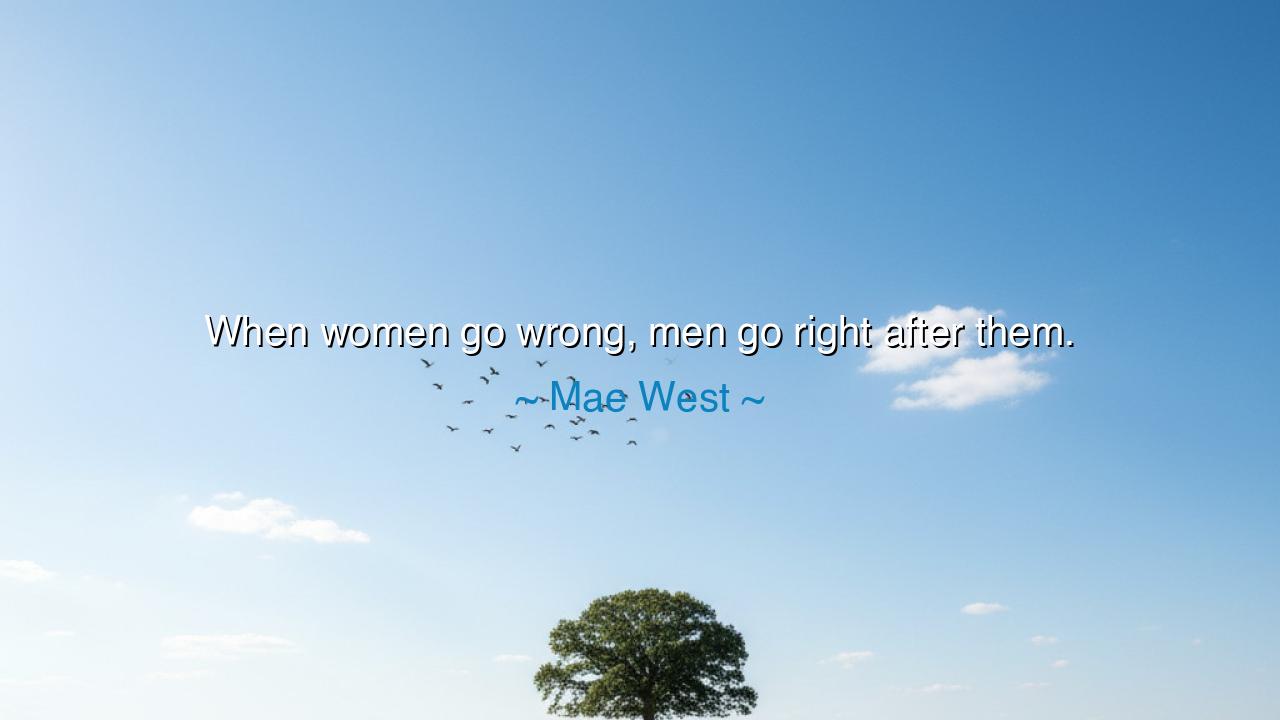
When women go wrong, men go right after them.






Come, O children, and listen closely to the words of Mae West, whose wit and wisdom echo through the ages. She said, "When women go wrong, men go right after them." At first, these words may seem lighthearted, a clever quip from a woman who was never afraid to speak boldly. But within them lies a deeper truth about the relationship between men and women, about the way in which society often judges the actions of women and how those actions are viewed by others—especially men. Mae West’s words speak to the way in which society places its gaze upon women, often turning them into objects of blame or temptation, while simultaneously encouraging men to pursue, control, or correct their supposed waywardness.
Consider, O children, the nature of blame throughout history. From ancient times to the present day, women have often been scapegoated for the ills of society. The story of Eve in the Garden of Eden is perhaps one of the oldest examples. When she took the forbidden fruit, it was Eve, not Adam, who was blamed for bringing sin into the world. Yet, we know that Adam stood by, complicit in his own way, and so the fall was shared by both. Still, the consequences of Eve’s actions were deemed far more dire, and the world has long been shaped by this narrative. In Mae West’s words, we see the echo of this ancient pattern, where women’s actions, often seen as rebellious or nonconforming, are pursued by men with a sense of ownership or correction.
In the same way, O children, consider the ancient idea of honor and virtue, often attributed to women as a measure of their value. In societies where women’s behavior was strictly regulated, a woman who stepped outside of the defined boundaries of acceptable conduct became a symbol of disruption—one to be either controlled, punished, or reformed. Mae West, in her own time, was a woman who challenged societal norms, openly embracing sexuality and individuality in a way that threatened the status quo. Her words, then, are a reflection of how men, in response to women who defy conventional expectations, often feel compelled to pursue, confront, or claim control over them.
But consider the role of men in this dynamic. Just as women may be blamed for straying from the expected path, men, too, are drawn to this straying as if they were following a natural course. Men’s reaction to a woman who "goes wrong" often does not arise from a place of understanding or sympathy, but from desire to exert their influence over that which they perceive as out of control. Think of the ancient hero Achilles, whose fury at Patroclus’s death led him to rage against the forces of Troy. His wrath was immense, but it was directed at the consequences of loss and uncontrollability. Similarly, in the realm of human relationships, men’s pursuit of women who defy the status quo can be an expression of the power struggle—an attempt to correct, claim, or regain control over that which is seen as slipping beyond their grasp.
In more recent times, consider the suffragettes who fought for women’s rights in the early 20th century. They were women who defied the social norms that dictated their place in society. The men who opposed them were not merely reacting out of a desire to maintain the status quo; they were pursuing a vision of control, an attempt to prevent the shift in societal power that these women represented. Mae West’s words ring true in these struggles, for when women take action that threatens the accepted order, men often do not sit idly by—they pursue, challenge, and sometimes even seek to contain that which threatens their authority.
The lesson in Mae West’s quote, O children, is one that asks us to reflect on the relationship between power, gender, and society’s expectations. The pursuit of women who "go wrong" is not just a matter of individual desire, but a reflection of deeper societal forces that seek to control what is perceived as out of line, as out of order. Yet, the true strength of a woman lies in her ability to exist authentically, to defy the constraints placed upon her, and to own her own story. And so, the call to action is clear: when you see the forces that seek to silence, control, or redefine women, do not merely stand by as a passive witness, but take a stand. Fight for the space where a woman can exist freely, without judgment or the need to be contained.
And, O children, in your own lives, understand this: when others seek to impose their will upon you or chase after you for being "different" or "disobedient," know that it is your voice, your courage, and your power that will determine the outcome. Embrace your path, just as Mae West did, for the truly powerful people are those who do not bend to the expectations of others, but carve their own way in the world. Stand tall, be authentic, and know that those who follow may not always understand the journey, but they will always be drawn to your strength.






AAdministratorAdministrator
Welcome, honored guests. Please leave a comment, we will respond soon